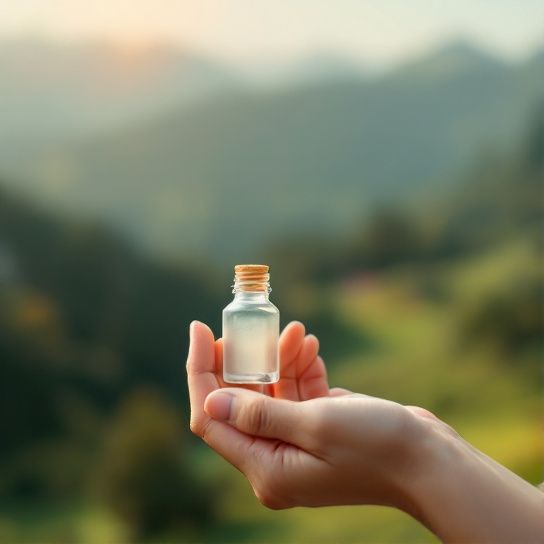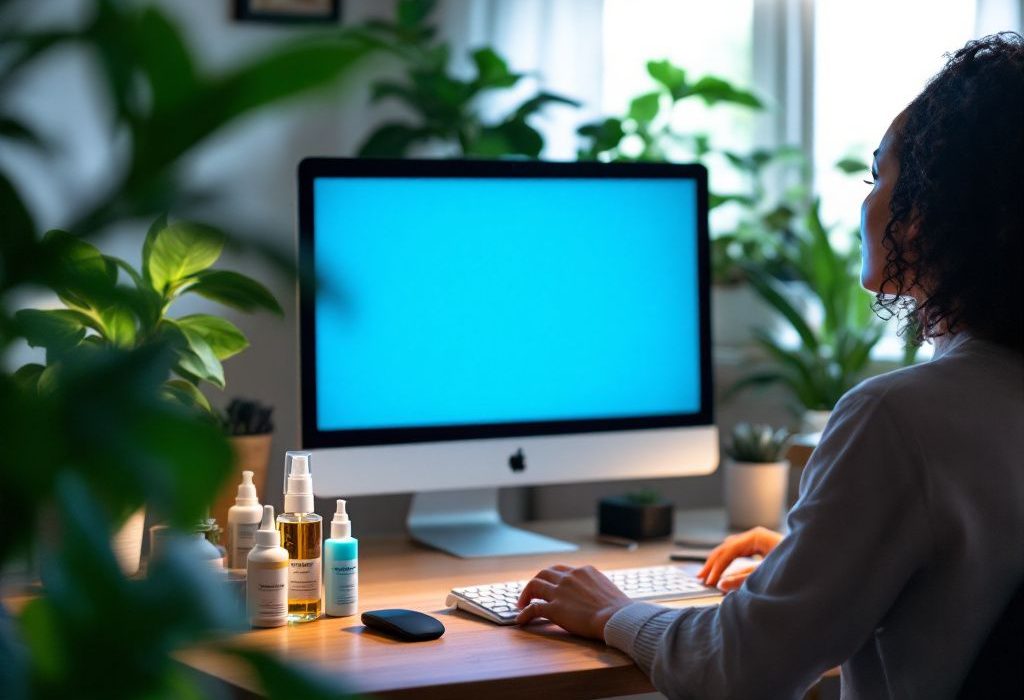Let’s face it, we live in a digital age. Screens are as much a part of our lives as our morning coffee. But here’s the problem: all this screen time isn’t just addictive—it’s wreaking havoc on our skin. We’re talking about digital skin damage, folks, and it’s a little annoying.
So, how do we defend our skin against our trusty electronics? That’s the juicy question we’re unpacking today. Dive in, and we’ll chat about some natural skincare strategies that just might keep your skin glowing as brightly as your devices.
The Secret Enemy: Blue Light
Ever heard of blue light? It’s basically high-energy visible (HEV) light, and it’s an innocent-looking little menace. Our screens emit this light, and it penetrates much deeper into our skin than UVA or UVB rays. Yikes. We’re talking real damage like premature aging, hyperpigmentation, and even an increase in sensitivity.
Imagine spending your days working hard on your laptop only to realize your skin’s tagging along for the ride and not in a good way. But hang on—don’t throw your devices out the window just yet. We’ve got some tricks to deal with it.
Natural Skincare to the Rescue
So, what can we do about it? Well, natural skincare is stepping up to the plate like a total hero. Let’s get to the juicy details:
- Antioxidant-Rich Products: Antioxidants are our skin’s best friend. Think of them like champs that battle free radicals from blue light exposure. Use serums or moisturizers packed with vitamin C, vitamin E, and niacinamide. You want a layer of protection that’s as relentless as your Instagram scroll.
- Moisturizing Wisely: All that blue exposure can dry your skin out—seriously. And dry skin is unhappy skin. Hydration is key, so opt for a lightweight, non-comedogenic moisturizer to lock in moisture without clogging your pores.
- Daily SPF: Just because you’re indoors doesn’t mean you’re off the hook. Sunscreen is as necessary as your morning caffeine fix, even when binging Netflix. Go for at least SPF 30 every single day. Top it up mid-day if you’re feeling fancy.
- Herbal Helpers: Natural herbs like chamomile or aloe vera are soothing and help reduce inflammation. You can incorporate them into your skincare routine just like you would with your herbal teas—in a way that feels like a daily calming ritual.
Watch Screen Time Like a Netflix Show

Hey, here’s a fact we often circle back to: too much screen time hurts—not just your focus but your skin’s longevity. Limit the time you spend with your face buried in screens. Give tech a rest with scheduled digital detox days or just brief device sabbaticals.
Quick Fix Ideas:
- Eyes 20-20-20 Rule: For every 20 mins on screens, take a 20-second break and focus on something 20 feet away. Yeah, your eyes need a breather too.
- Incorporate Screen Breaks: Stretch, move around, pet your dog—anything to move away from the laptop coma.
- Mindful Tech Use: Schedule your screen use, like pre-set time for hobbies away from electronics.
Balancing Moisture and Defense
Believe it or not, there’s a fine balance in skincare, just as there is in life. Hydration and protection should be your dual focus. Imagine you’re the proud parent of a radiant skin child—it requires consistent discipline and love.
Key Elements in Your Skincare Arsenal

Alongside your beloved moisturizer and sunscreens, a few other elements deserve a seat at the cool-kids table. Don’t overlook products or habits that are versatile and functional.
- Face Mists with Antioxidants: Think of these as your midday skin treat. A quick medication of refreshment that hydrates while replenishing antioxidant reserves.
- Facial Oils as Shields: Lightweight botanical oils like rosehip seed oil can act as a protective barrier against pollutants, yes, even of the digital variety.
- Gentle Cleansers: End your day with a thorough yet gentle cleanse that rids your skin of any build-up without stripping it of its natural goodness.
Common Mistakes to Avoid
We all have our skincare sins—no need for guilt trips here; it’s a judgement-free zone. But it helps to learn from errors others have made, for subtle shifts make brilliant outcomes.
- Over-exfoliating: Your skin doesn’t need daily scrubbing. Once or twice a week is more than enough.
- Skipping Moisturizer After Toning: Those with oily skin might think it’s unnecessary, but even oily skin benefits from balanced moisture.
- Going to Bed With Makeup Dirt: In the age of abbreviated routines, don’t skip PM cleansing. Even when you’re exhausted from screen-staring.
- Neglecting Your Neck & Hands: Newsflash! They age just like your face. Show them love.
Tech Tools That Lend a Hand
We’re talking about a tech-savvy world—it makes sense to leverage technology for protection, right? Well, certain gadgets aim to mitigate some of that blue wave.
- Screen Protectors with Blue Light Filters: You’ve shielded your phone with a physical protector, now how about one that safeguards your face too? These nifty films can filter out a good portion of harmful emissions.
Try These Apps:

- F.lux: Adapts the color of your screen based on the time of day. Reduce blue light stress while easing into bed.
- Night Shift Mode on your Phone: Don’t ignore this built-in option—turn it on for a yellow tint and shade of safety at night.
Foods That Nourish From Within
Nutrition affects everything, skin health included. Ever noticed how a balanced meal makes your entire being thrive? Incorporate blue-blocking nutrients in your daily meals to make their miraculous way to your skin right from within your body.
Food-Rich in Essential Skincare Nutrients:
- Something Citrus: Oranges and lemons packed with vitamin C.
- Berries Burgess: A handful of colorful magical boosts with antioxidants.
- Greens Galore: Spinach and broccoli are powerful shields against the unwanted effects of non-stop blue exposure.
- Nuts & Seeds: Omega-3s are nourishment bliss in a palm-sized snack.
Wrap Up: Tech Defense from Digital Aged Distress
In the ins and outs of daily life, making conveniences and choices that support well-being reflect personal triumphs. Digital-age exposure draws a new need for skincare protection—embrace routines that suit the new normal just right.
Embarking upon nature’s offerings coupled with tech solutions cyanobacticably resilient strategy carries longevity. Acknowledge the screen time toll, treat your skin like a dear friend, and it will likely thank you with a healthy and timeless glow.
Find the balance that works for you and your skin in a digitized world. The natural skincare approach is more than a buzzword; it’s a contemporary lifestyle. Trust me (and nature) on this one.
Frequently Asked Questions
What are the benefits of using natural skincare products?
Natural skincare products offer several benefits, including being gentler on the skin, reducing the risk of irritation and sensitivity, and providing nourishment through vitamins, minerals, and antioxidants. They are free from harsh chemicals, synthetic pesticides, and artificial fragrances, making them a healthier choice for the skin and the environment[1][3][5).
How do natural skincare products help in preventing premature skin aging?
Natural skincare products help prevent premature skin aging by containing antioxidant-rich plant extracts that protect against free radical damage. These products work in sync with the body, reducing wrinkles, fine lines, and other signs of aging without exposing the skin to potentially harmful substances[1][3][5).
Are natural skincare products suitable for people with sensitive skin?
Yes, natural skincare products are highly suitable for people with sensitive skin. They are made from natural ingredients that are less likely to cause irritation, dryness, or breakouts. These products often include soothing ingredients like coconut oil, sandalwood powder, and turmeric, which help in healing and nourishing the skin[1][3][5).
What are the environmental benefits of using natural skincare products?
Natural skincare products are eco-friendly because they are made from natural ingredients that do not leave chemical residues in the environment. They do not pollute the soil or water when washed down drains, and they are often sourced from organic farming practices that avoid synthetic pesticides and fertilizers[1][3][5).
References

